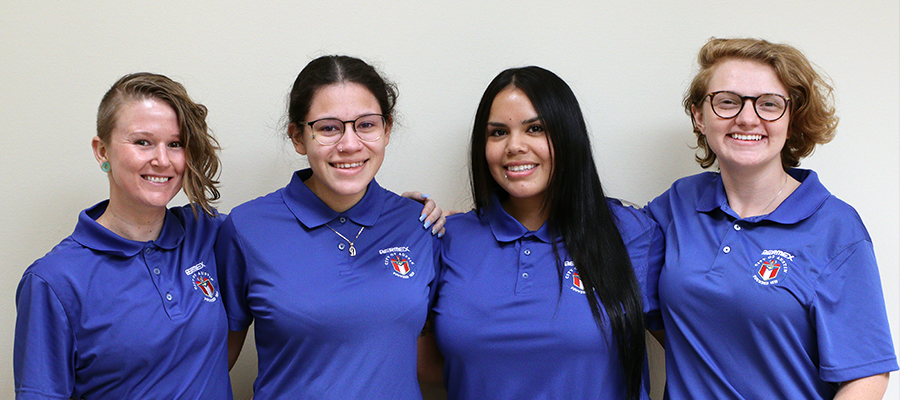Austin, Texas Team Recognizes Key Members

Austin, Texas Team Recognizes Key Members
Over the last year and a half, the Bermex team in Austin, Texas has experienced its fair share of change. Under the leadership of Operations Manager Phillip Hollis, their current project has been renewed and he credits a team of four women with just the right experience to help lead the charge.
Before transitioning to management roles, Alejandra Balcazar, a meter services supervisor; Hannah Bell, a meter services supervisor; Mercedes Salas, a meter services supervisor; and Hannah Summer, a validator/reviewer specialist, all started at Bermex as meter readers. While reflecting on their time in the field, they shared that they would read 500-600 meters a day and walk up to 20 miles a day.
“What they bring to the table from being readers helps them on the management end to be able to make the decisions they need to make for this operation to be successful. They know what it’s like to be out there reading. They know what the readers are up against, they know what the routes are like, and what is expected of them,” says Michael Wilson, a meter services supervisor who serves on the Bermex Ready Force Team.
As a validator, Summer reviews meter readers’ high and low audits in live time. Each field employee must take a picture of each meter to showcase the number – if it gets flagged as high or low based on the previous month’s read, Summers looks at it. Validators approve a few thousand reads a day or they send them back so the employees can fix their reads.
The rest of the team, as supervisors assign routes to the meter readers, check in on them throughout the day, adjust routes throughout the day to complete the cycles more efficiently, and more.
“They have a lot they’re taking care of here. They have their teams that you can see in Workday, but they take care of all 50-plus people out in the field. Here in Austin, the routes are spread all over the entire city – every day. Logistically, they’re going through and seeing who needs to go where so we can get everything taken care of by the end of the day. The work they’re doing is very important, tedious, and involved,” says Wilson.
One important change the team of four has noticed is a shift in communication – for the better.
“Now, we make sure that everybody is communicated to well, fairly, and everybody gets the same message,” says Bell.
Balcazar reflects on the previous lack of communication and adds, and on top of that, they were low-staffed for a long time which led to putting in 14-hour days and working weekends.
“Having all of us in the office, the communication is much better. The readers get less frustrated. They just want to get their stuff done and go home. We’ve been leaving pretty early with everyone’s hard work, too,” says Salas.
Summers agrees. She shares, “One of the most rewarding parts about this job is whenever we can successfully communicate well. We can be faced with hard days sometimes and the fact that we’re all able to communicate very well makes it so this job can be easier. Whereas before, we had issues where we couldn’t communicate with each other, and it caused issues for the meter readers. Being able to have a good, solid group in the office has allowed the field employees to get their routes cleared and done faster.”
With the work of Hollis over the last many months, the team recognizes several other improvements – better communication, hours, salaries, staffing, and more.
Wilson notes that these changes wouldn’t have been possible without Balcazar, Bell, Salas, and Summer.
“I really didn’t want them to transition to their new roles because of the number of meters they were putting up – they are strong readers. It was a hard thing to pull them from the field. But I knew it was for the best and they’ve been able to help bring new people in and keep them here,” says Wilson.
Related Articles

By Tommy Combs, President, Bermex In the latest edition of the DIRT Report, the Common Ground Alliance (CGA) reveals that despite decades of progress in underground infrastructure damage prevention, the industry remains at a critical turning point. The 2024 data show a concerning plateau, and in some cases a reversal, in the trend of reducing[...]
Read More
Bermex was founded by two like-minded individuals with a passion for helping people. Since 1972, we’ve been working towards providing the best solutions by reducing our clients’ costs and minimizing customer complaints. We work with gas, electric, and water utility companies to design a plan that best fits the challenges our customers face. As Bermex[...]
Read More
Veterans Day is a time for us to pay our respects to those who have served. For one day, we stand united in respect for you, our veterans. The military men and women who serve and protect the United States come from all walks of life; they are parents, children, grandparents, friends, neighbors, and coworkers,[...]
Read More
When Robert Gallicchio saw an ad for an open meter reader position at Bermex nearly two and a half decades ago, he thought of it as a fun job, not necessarily a long-term career. He joined the United States Navy after graduating high school and served our country as a hospital man for eight years,[...]
Read MoreCategories
Recent Posts
- Diffusing a Difficult Customer [Infographic] 10th Sep 2018
- Neighborhood Safety [Infographic] 24th Sep 2018
- Bermex Has Named Keith Pancake as New Safety Manager 02th Dec 2019